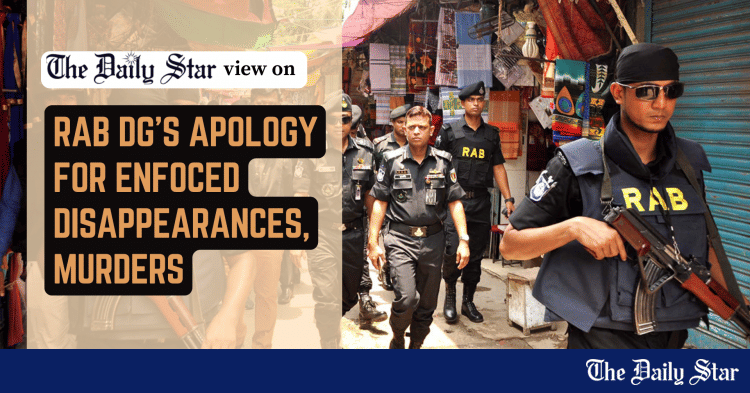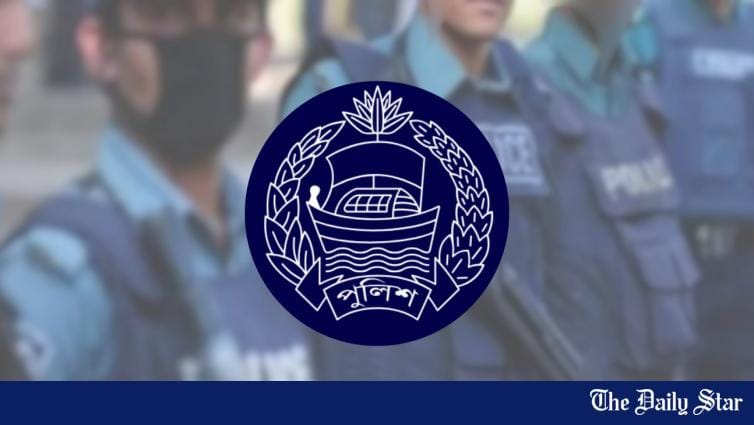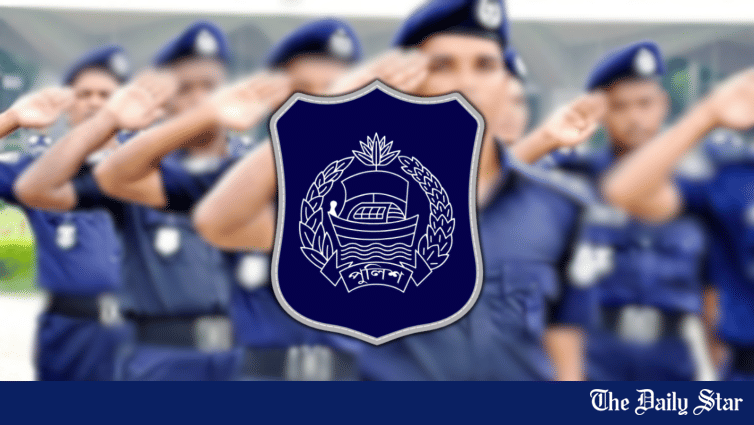- Copy to clipboard
- Thread starter
- #46

Bangladesh's elite force RAB, sanctioned by US, seeks public apology for misdeeds
The Rapid Action Battalion on Thursday in an unprecedented gesture sought public apology for the extrajudicial killings, enforced disappearances and all other misdeeds it had perpetrated since its establishment till date.
 www.newagebd.net
www.newagebd.net
Bangladesh's elite force RAB, sanctioned by US, seeks public apology for misdeeds
Tanzil Rahaman and Prattayee Chakma 12 December, 2024, 16:28

The Rapid Action Battalion on Thursday sought public apology for the extrajudicial killings, enforced disappearances and all other misdeeds it had perpetrated since its establishment till date.
Its director general AKM Shahidur Rahman sought the apology on behalf of the force while responding to questions at a press conference held at its Media Centre in the capital’s Karwan Bazar.
‘I apologise to the victims and their families who were tortured and harmed by RAB members since its establishment. I also apologise to people and the families of those, including the seven men murdered in Narayanganj, who were killed by the RAB,’ said Shahidur, also an additional inspector general of police.
He said that only bringing the perpetrators of these crimes to justice through fair investigations could redeem the RAB as an institution from such allegations.
He also assured that the force would not involve in such acts on anyone’s order in the future.

Total 3,973 people were killed in reported crossfire allegedly during encounters with members of law enforcement and security agencies and also died in their custody between January 2004 and June 2024, according to rights organisation Ain O Salish Kendra.
Of them, 1,286 people were killed during the gunfights with the RAB and while held in their custody, as reported by the elite force, the ASK data shows. It also shows that the RAB and police are jointly accused of 94 killings in the timeframe.
The Rapid Action Battalion was founded in 2004 as an elite force with members from the police, army, navy, air force and Border Guard Bangladesh aimed at improving the volatile law and order situation.
On December 10, 2021, the United States Treasury Department imposed sanctions on the RAB for human rights abuse.
RAB chief Shahidur at the press conference said that the Commission for Inquiry on Enforced Disappearances was investigating into the all allegations of the enforced disappearances, extrajudicial killings and secret detention centre, popularly known as Aynaghar.
Acknowledging the existence of the force’s secret detention centres, Shahidur said that they had kept their detention centres, popularly known as Aynaghar, as they were in the past following the directives of the inquiry commission for the enforced disappearances not to make any changes to their structures.
On November 5, the Commission for Inquiry on Enforced Disappearances said that it had received complaints of enforced disappearance of over 1,600 victims, the incidents of which occurred during the immediate past 15-year rule of the now ousted Awami League.
About 200 victims of enforced disappearances remain still traceless.
BRAC University teacher Nabila Idris, also the commission’s member, told New Age that they had found many secret detention centres of the RAB.
‘The RAB DG also admitted the matter about the secret detention centres. We are not doing investigation into extrajudicial killings, but many incidents of enforced disappearance have ended in perpetration of extrajudicial killings,’ said Nabila.
The families of seven people, who were abducted on April 27, 2014 and killed by some RAB members in Narayanganj, are still waiting for justice to be finally delivered.
Three days later, on April 30, 2014, the bodies of local Awami League leader and Narayanganj City Corporation councillor Nazrul Islam, his associates Tazul Islam Rassel, Liton, and Swapan and his driver Jahangir, and Narayanganj court lawyer Chandan Sarker and his driver Ibrahim were found afloat in the Sitalakhya River. The discovery of the bodies led to a lengthy battle for justice that has yet to end.
The long wait for justice has left the victims’ families deeply frustrated as appeals filed by death-row convicts, including then Awami League leader Noor Hossain and then RAB commanding officer Lieutenant Colonel Tarek Sayeed Mohammad, has remained pending with the Appellate Division for more than five years now.
According to court officials, the appeals of 20 out of the total 35 convicts have remained pending with the Appellate Division.
Teknaf municipal councillor Ekramul Haque, who was a member of the then ruling Awami League, was killed in a reported gunfight with the RAB at Noakhalipara on Teknaf Marine Drive Road in Cox’s Bazar on the night of May 26, 2018.
The killing sparked an outcry after a mobile phone conversation between Ekramul and his daughter went viral on social media.
At the Thursday’s press conference, when asked about the calls for abolishing the RAB, force chief Shahidur said that the decision would depend on the government.
‘If the government abolishes the organisation, we will accept it,’ he said.
Shahidur gave the commitment that the force would operate with transparency and integrity to restore public trust in the organisation under him.
Replying to a query, he said that 16 RAB members were arrested for crimes, including extortions, drug-related offences and robberies, after the regime change on August 5.
‘Criminal cases were also filed against them. If anyone gets involved in such activities in the future, criminal and departmental actions will be taken against them,’ he added.
The chief of the Rapid Action Battalion revealed that since the force’s inception, 58 officers and 4,235 members had faced disciplinary actions for various offences.
The force has also failed to submit the charge-sheet of much-talked about journalist couple Sagar Sarowar and Meherun Runi to the court for 114th times till October 15 this year.
On September 30, the High Court ordered the formation of a task force to probe the case that remained unsolved for 12 years.
Admitting his force’s failure to give any expected results over the investigation, the RAB director general said that the force’s inability in this regard led to the High Court directive to form a high level probe committee.
Responding to another question over the failure of submitting the charge sheet of Taqi murder case in Narayanganj, the RAB chief said, six arrests were made before August 5. Two of them gave confessional statements under Section 164.
The body of Tanwir Muhammad Taqi, an A-Level student, who went missing on March 6, 2013, was recovered some days later from River Sitalakhya.
‘We have also arrested another six people after August 5. One of them gave confessional statement,’ Shahidur Rahman added.
Tanzil Rahaman and Prattayee Chakma 12 December, 2024, 16:28
The Rapid Action Battalion on Thursday sought public apology for the extrajudicial killings, enforced disappearances and all other misdeeds it had perpetrated since its establishment till date.
Its director general AKM Shahidur Rahman sought the apology on behalf of the force while responding to questions at a press conference held at its Media Centre in the capital’s Karwan Bazar.
‘I apologise to the victims and their families who were tortured and harmed by RAB members since its establishment. I also apologise to people and the families of those, including the seven men murdered in Narayanganj, who were killed by the RAB,’ said Shahidur, also an additional inspector general of police.
He said that only bringing the perpetrators of these crimes to justice through fair investigations could redeem the RAB as an institution from such allegations.
He also assured that the force would not involve in such acts on anyone’s order in the future.
Total 3,973 people were killed in reported crossfire allegedly during encounters with members of law enforcement and security agencies and also died in their custody between January 2004 and June 2024, according to rights organisation Ain O Salish Kendra.
Of them, 1,286 people were killed during the gunfights with the RAB and while held in their custody, as reported by the elite force, the ASK data shows. It also shows that the RAB and police are jointly accused of 94 killings in the timeframe.
The Rapid Action Battalion was founded in 2004 as an elite force with members from the police, army, navy, air force and Border Guard Bangladesh aimed at improving the volatile law and order situation.
On December 10, 2021, the United States Treasury Department imposed sanctions on the RAB for human rights abuse.
RAB chief Shahidur at the press conference said that the Commission for Inquiry on Enforced Disappearances was investigating into the all allegations of the enforced disappearances, extrajudicial killings and secret detention centre, popularly known as Aynaghar.
Acknowledging the existence of the force’s secret detention centres, Shahidur said that they had kept their detention centres, popularly known as Aynaghar, as they were in the past following the directives of the inquiry commission for the enforced disappearances not to make any changes to their structures.
On November 5, the Commission for Inquiry on Enforced Disappearances said that it had received complaints of enforced disappearance of over 1,600 victims, the incidents of which occurred during the immediate past 15-year rule of the now ousted Awami League.
About 200 victims of enforced disappearances remain still traceless.
BRAC University teacher Nabila Idris, also the commission’s member, told New Age that they had found many secret detention centres of the RAB.
‘The RAB DG also admitted the matter about the secret detention centres. We are not doing investigation into extrajudicial killings, but many incidents of enforced disappearance have ended in perpetration of extrajudicial killings,’ said Nabila.
The families of seven people, who were abducted on April 27, 2014 and killed by some RAB members in Narayanganj, are still waiting for justice to be finally delivered.
Three days later, on April 30, 2014, the bodies of local Awami League leader and Narayanganj City Corporation councillor Nazrul Islam, his associates Tazul Islam Rassel, Liton, and Swapan and his driver Jahangir, and Narayanganj court lawyer Chandan Sarker and his driver Ibrahim were found afloat in the Sitalakhya River. The discovery of the bodies led to a lengthy battle for justice that has yet to end.
The long wait for justice has left the victims’ families deeply frustrated as appeals filed by death-row convicts, including then Awami League leader Noor Hossain and then RAB commanding officer Lieutenant Colonel Tarek Sayeed Mohammad, has remained pending with the Appellate Division for more than five years now.
According to court officials, the appeals of 20 out of the total 35 convicts have remained pending with the Appellate Division.
Teknaf municipal councillor Ekramul Haque, who was a member of the then ruling Awami League, was killed in a reported gunfight with the RAB at Noakhalipara on Teknaf Marine Drive Road in Cox’s Bazar on the night of May 26, 2018.
The killing sparked an outcry after a mobile phone conversation between Ekramul and his daughter went viral on social media.
At the Thursday’s press conference, when asked about the calls for abolishing the RAB, force chief Shahidur said that the decision would depend on the government.
‘If the government abolishes the organisation, we will accept it,’ he said.
Shahidur gave the commitment that the force would operate with transparency and integrity to restore public trust in the organisation under him.
Replying to a query, he said that 16 RAB members were arrested for crimes, including extortions, drug-related offences and robberies, after the regime change on August 5.
‘Criminal cases were also filed against them. If anyone gets involved in such activities in the future, criminal and departmental actions will be taken against them,’ he added.
The chief of the Rapid Action Battalion revealed that since the force’s inception, 58 officers and 4,235 members had faced disciplinary actions for various offences.
The force has also failed to submit the charge-sheet of much-talked about journalist couple Sagar Sarowar and Meherun Runi to the court for 114th times till October 15 this year.
On September 30, the High Court ordered the formation of a task force to probe the case that remained unsolved for 12 years.
Admitting his force’s failure to give any expected results over the investigation, the RAB director general said that the force’s inability in this regard led to the High Court directive to form a high level probe committee.
Responding to another question over the failure of submitting the charge sheet of Taqi murder case in Narayanganj, the RAB chief said, six arrests were made before August 5. Two of them gave confessional statements under Section 164.
The body of Tanwir Muhammad Taqi, an A-Level student, who went missing on March 6, 2013, was recovered some days later from River Sitalakhya.
‘We have also arrested another six people after August 5. One of them gave confessional statement,’ Shahidur Rahman added.















